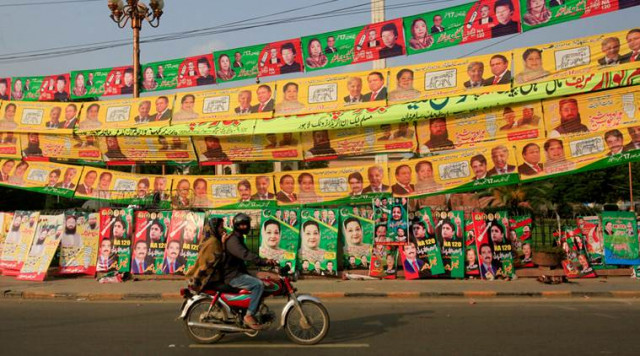Why ‘Electables’?
'Electables' are direct consequence of 'biraadari' system

Residents ride on bike past election campaign signs along a road in Lahore, Pakistan. PHOTO: REUTERS
“Electables” in Pakistan mean those electoral candidates who have the wherewithal to win parliamentary seats in their respective areas. In other words, “electables” are those electoral candidates who have sufficient or significant clout, on the basis of their social position, to secure victory in parliamentary elections in specific constituencies.
Traditionally, the PPP and the PML-N have been enjoying the support of most of the “electables” in different parts of Pakistan, particularly in Punjab, Sindh and Balochistan as in K-P “electables” have had insignificant political role. This time around one of the frontrunners in the general election, the PTI of Imran Khan, has been under a lot of focus and criticism for swaying and wooing a large number of “electables.” The PTI has been criticised by political analysts and detractors for pocketing “electables” while also claiming and clamouring for bringing about change in Pakistan and also effecting a change in the political status quo. This is a very valid criticism.
However, the PTI and its head, Khan, for their part are also equally convincing that without having these “electables” one cannot hope of attaining political power in Pakistan because the masses and voters in general in the country vote largely for the so-called “electables” because of their social role and influence.
Thus pocketing as many “electables” as possible seems to be the compulsion of our mainstream political parties but the matter needs some deep digging that why it is so. Although the roots of this issue rest in our political and social system, conventional political parties primarily the PPP, ANP, JUI-F, and Jamaat-e-Islami (JI) have been fundamentally responsible for this state of affairs and not the PML-N and the PTI. Because when under the 1973 constitution of Pakistan a parliamentary form of government was agreed for the country the PPP, NAP (forerunner of the ANP), JUI (forerunner of the JUI-F) and JI were part of the political bargaining. At that time the PML-N and the PTI were non-existent. The then leadership of political parties who agreed to have a parliamentary political system in the country in the 1970s either was myopic or self-centered as everyone wanted to secure a share in the political power irrespective of its electoral strength and limited political constituency. However, this mistake has cost dearly to the state and society of Pakistan.
The parliamentary political system is based on constituency-based electoral contests for the federal and provincial legislatures. In such a political system influential families, clans, tribes as well as biradaries (communal groups based on primordial relations) in a particular area, where electoral constituencies are located, have a predominant role. Thus the parliamentary political system of Pakistan since the early 1970s has been reinforcing the tribe-biradari system whereas Pakistan in order to emerge as a modern, forward-looking, welfare state needed the overcoming of these primordial bonds and linkages.
In other words, the parliamentary political system of Pakistan reinforced the tribe, biradari system and this has been a major source of political instability in Pakistan. The “electables” are the direct consequence of this system and situation and no political party could ignore the importance of “electables” irrespective of the fact that they are an anathema.
Now the PML-N, which since the early 1980s has been coming to power riding the shoulders of “electables,” is also feeling the heat as many of them have ditched the party. This is the very reason that the PML-N president and its nominee for the slot of next prime minister, Mian Shehbaz Sharif, made a very important statement that the country needed a new social contract.
Hypothetically speaking as there had been a presidential or even a proportional representative political system, like the one in Germany, political parties would not have needed “electables” and then become hostage to them. So our decision-makers and opinion-makers like us have to think out of the box to have true democracy and a stable political system in Pakistan.
Published in The Express Tribune, July 9th, 2018.
Like Opinion & Editorial on Facebook, follow @ETOpEd on Twitter to receive all updates on all our daily pieces.















COMMENTS
Comments are moderated and generally will be posted if they are on-topic and not abusive.
For more information, please see our Comments FAQ